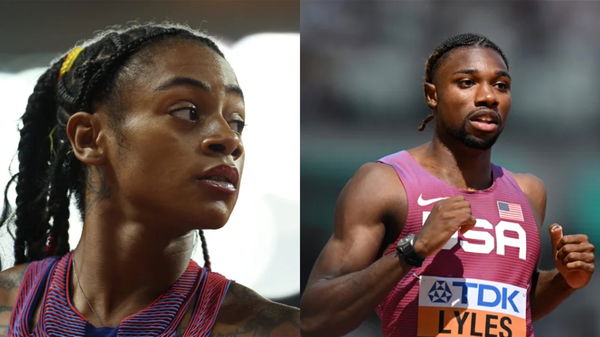
via Getty
Image credits : Getty

via Getty
Image credits : Getty
Despite being such a spotlight-stealing sport with all the fanfare, track and field athletes have been reminding everyone that fame alone doesn’t pay the bills! The expenses that accompany an athlete’s participation often sprint past the rewards. Ahead of the Olympic trials, Kenny Bednarek highlighted this financial strain on athletes, stating, “The cost to fly and accommodate my team at the trials and Olympics is pretty wild. Prices are jacked up.”
His sentiments found resonance in Noah Lyles, who has recently lent his voice to the cause alongside stalwarts like Sha’Carri Richardson, shining a light on the pervasive disparities in compensation. Against this backdrop of growing concern, track legends are stepping forward to amplify athletes’ woes, underscoring the critical need for financial security, especially in retirement.
ADVERTISEMENT
Article continues below this ad
Track and field veterans shed light on retired athletes’ woes
On an episode of Ready Set Go that premiered on May 23, 2024, track and field icons Justin Gatlin and Rodney Green sat down for another intriguing discussion about all the latest happenings in the sport. An intriguing topic was brought up when the duo discussed the importance of taking advantage of opportunities early. Rodney Green elaborated on the financial struggles athletes face after their sports careers end.
He explained that many athletes who earned six-figure salaries during their careers found it challenging to transition to regular jobs, as their degrees often did not lead to similarly high-paying positions. Green pointed out that athletes might earn substantial amounts, like $250,000 to $350,000, but then have to adjust to jobs offering significantly lower salaries, such as $80,000.
This discrepancy led some athletes to prolong their athletic careers beyond their prime because the financial benefits of continuing to compete outweighed the earnings they could make in the conventional workforce. Similarly, five-time Olympic medalist Justin Gatlin noted that many athletes stayed in the sport, continuing to compete even when their performances were no longer at their peak.

via Getty
LONDON, ENGLAND – AUGUST 04: Justin Gatlin of the United States competes in the Men’s 100 metres heats during day one of the 16th IAAF World Athletics Championships London 2017 at The London Stadium on August 4, 2017 in London, United Kingdom. (Photo by Shaun Botterill/Getty Images)
Gatlin explained that this was because the money earned from competing was quick and relatively substantial compared to what they might earn in traditional jobs. He said, “Audience, you have to understand that this is quick money. This is good money. This is quick money.” Gatlin also highlighted that without a traditional retirement fund, 401(k), or pension, athletes had to make the most of their earning potential while they were still able to compete.
He said, “We get no retirement fund. We get no 401(k), okay? We get no pension. We get none of that. So go ahead and keep making your money until you get your pockets where you need to be or either they close the door on you as a sport, period. And then you got to move on.” As we reflect on these words, let us see how Sha’Carri Richardson and Noah Lyles have shed light on unfair pay.
How Noah Lyles and Sha’Carri Richardson have lent their voices in the fight
Kenny Bednarek’s post on X, where he highlighted the financial strain of preparing for the 2024 U.S. Olympic Team Trials, struck a chord within the track and field community. Noah Lyles, acknowledging the shared struggle, said in a reply, “It’s hard for all of us man.” Bednarek further emphasized the lack of financial support from USATF for athletes’ accommodation and expenses during competitions, leaving those without sponsors to bear significant costs during crucial moments in their careers.

ADVERTISEMENT
Article continues below this ad
Similarly, Sha’Carri Richardson’s Instagram post on December 6, 2023, challenged the transparency of Team USA’s fundraising claims, with Richardson stating, “Do not donate. The athletes that need this money don’t see it.” These incidents shed light on the ongoing issue of pay disparities. In 2022, it was also made known that only 20% of the top 10 athletes earned over $50,000 annually. Former athlete Aaron Kingsley Brown succinctly captured the dilemma by stating, “Imagine a profession where you need to be World Top 10 just to begin earning a decent wage.”

ADVERTISEMENT
Article continues below this ad
At the time, Richardson echoed this sentiment, urging more athletes to speak up and confront these issues. As we reflect on the views shared by Justin Gatlin and Rodney Green, it’s evident that financial disparities continue to plague track and field stars at all levels. What are your thoughts on the concerns raised by the icons in the sport? Comment below!
ADVERTISEMENT
ADVERTISEMENT
ADVERTISEMENT
ADVERTISEMENT

